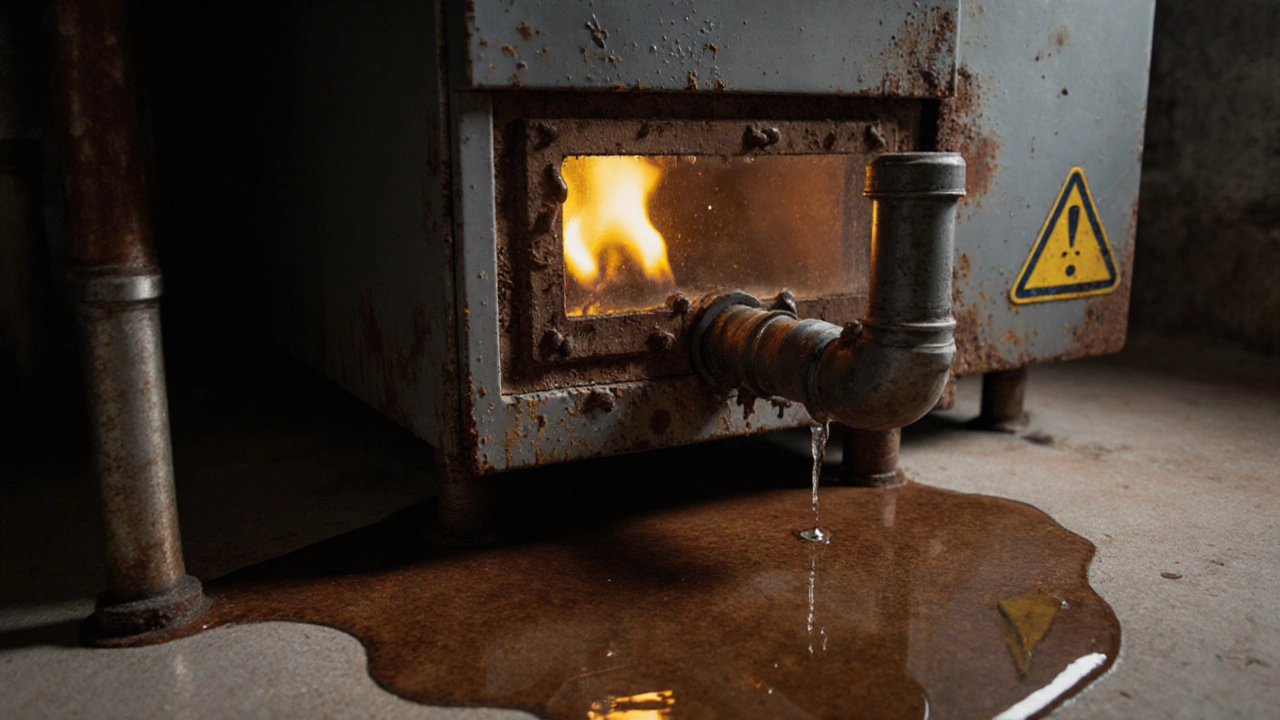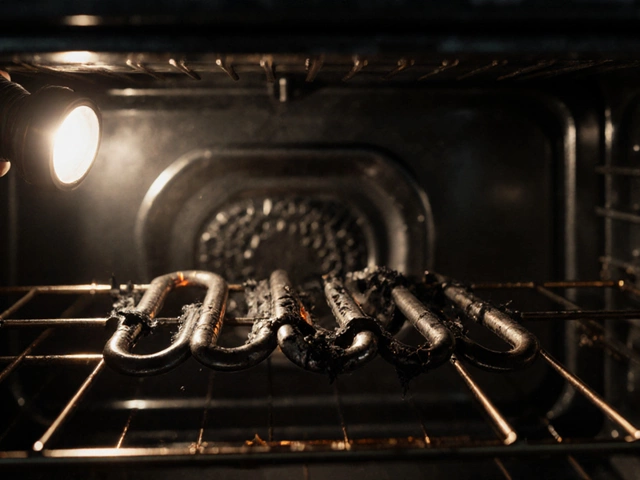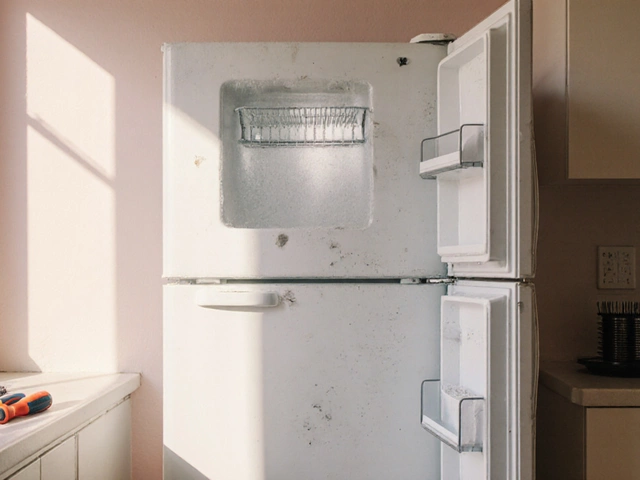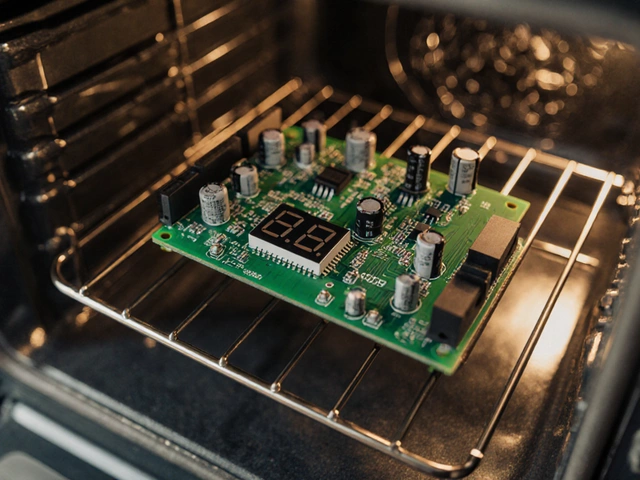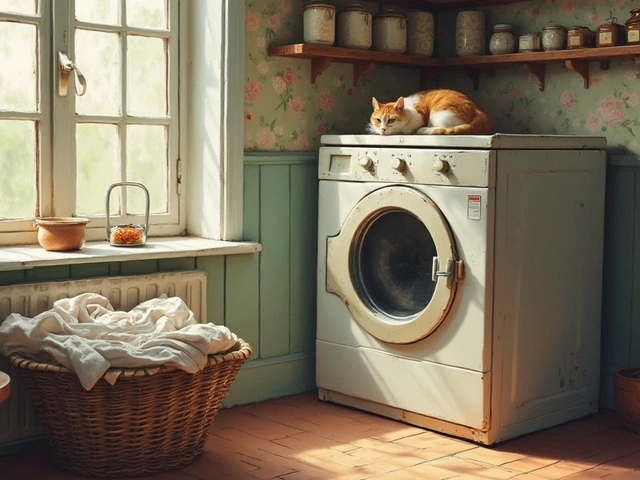Boiler Repair vs Replacement Cost Calculator
Boiler Information
Helpful Tips
Results
Enter your boiler information and click "Calculate Now" to see whether repair or replacement is more cost-effective for your situation.
When your boiler starts making strange noises, leaking water, or just won’t heat the house anymore, you’re faced with a tough choice: spend money fixing it, or bite the bullet and buy a new one. It’s not just about money-it’s about safety, comfort, and your long-term energy bills. In Brisbane, where winters can dip below 10°C and homes rely on reliable heating, this decision matters more than you think.
How old is your boiler?
Age is the biggest clue. Most boilers last between 10 and 15 years. If yours is 12 or older and you’re facing a repair, it’s usually smarter to replace it. Why? Because older boilers aren’t just inefficient-they’re more likely to break again soon. A 14-year-old boiler might only be running at 70% efficiency. New models today hit 94% or higher. That means for every $100 you spend on gas, you’re wasting $30 on heat that escapes instead of warming your home.
Here’s what most homeowners don’t realize: the cost of repeated repairs adds up fast. Fixing a pump, replacing a pressure valve, or cleaning a heat exchanger might cost $300-$600 each time. Do that three times in two years? You’ve spent $1,200-and you’re still stuck with a dying unit. At that point, you’re just delaying the inevitable.
Signs your boiler needs replacing, not repairing
- Yellow or flickering flame - A healthy boiler flame is blue. Yellow means incomplete combustion, which can produce carbon monoxide. This isn’t a repair job-it’s a safety emergency.
- Strange smells - A rotten egg smell (like sulfur) means gas is leaking. Turn off the boiler and call a professional immediately. No repair fixes a gas leak properly if the unit is old.
- Water pooling around the boiler - Small leaks can be fixed. But if you see rust, corrosion, or water seeping from the body of the boiler, the tank or heat exchanger is failing. Replacing it is cheaper than risking a full system collapse.
- High energy bills with no change in usage - If your gas bill jumped 25% this winter and you haven’t changed your habits, your boiler is working harder than it should. Efficiency drops sharply after 10 years.
- Repeated breakdowns - If you’ve called a technician twice in the last six months, you’re in the danger zone. One repair is normal. Two or more? You’re paying to keep a relic alive.
Repair costs vs. replacement costs in 2025
Let’s break it down with real numbers from Brisbane. A typical boiler repair ranges from $250 to $800, depending on the part. Common fixes:
- Thermostat replacement: $200-$350
- Pump replacement: $400-$700
- Heat exchanger repair: $600-$1,200
- Pressure valve fix: $150-$300
But here’s the catch: if your boiler is older than 10 years, replacing the heat exchanger might cost $900-but the unit will still be 12 years old. That’s like putting a new engine in a 1998 car. It’ll run, but you’re still paying for fuel, insurance, and frequent tune-ups.
A new boiler in Brisbane costs between $3,000 and $6,000 installed. That sounds steep, but you get:
- A 10-year warranty on parts and labor
- Up to 40% lower gas bills
- Quiet operation and instant hot water
- Smart controls you can manage from your phone
- Compliance with current Australian safety and efficiency standards
Some homeowners think they can save by buying a cheap boiler online and installing it themselves. Don’t. Gas work in Australia requires a licensed plumber. DIY gas connections are illegal and dangerous. Plus, unlicensed installations void warranties and make insurance claims impossible if something goes wrong.
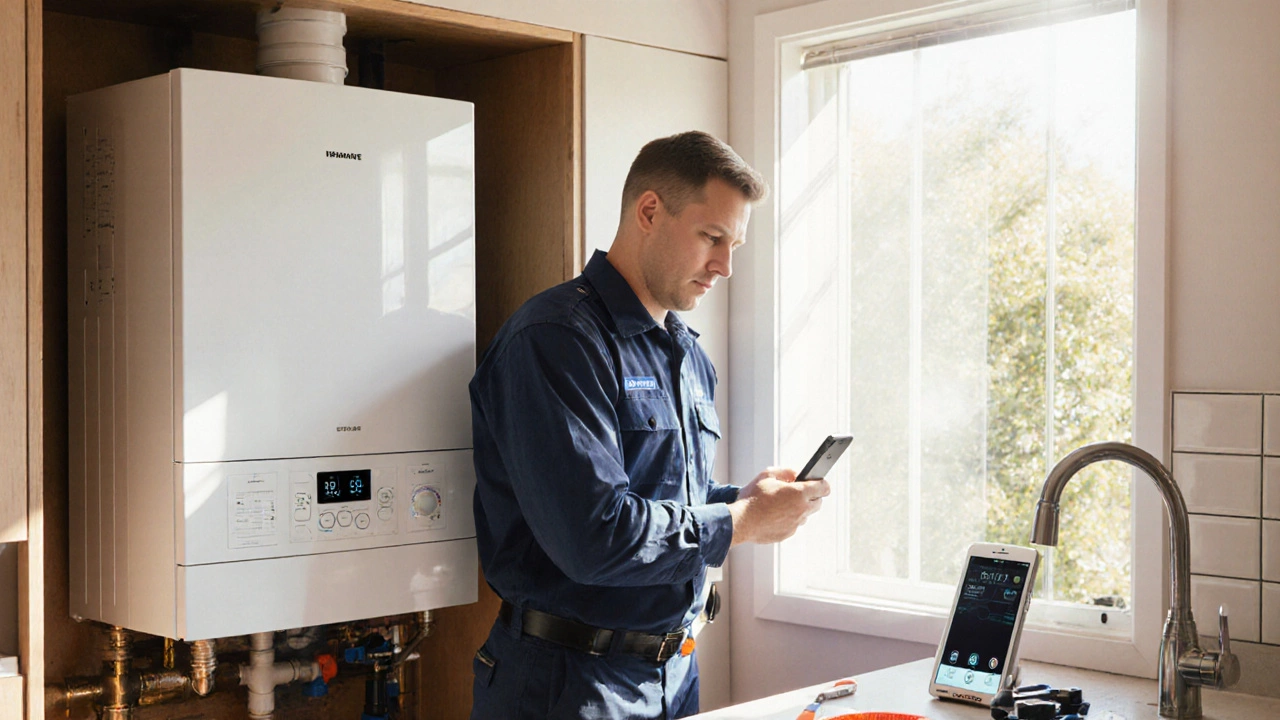
Government rebates and incentives
In 2025, Queensland offers rebates for replacing old boilers with high-efficiency models. The Home Energy Efficiency Program gives up to $1,500 back if you install an A-rated condensing boiler. Some local councils also offer $500-$1,000 in additional rebates for low-income households or pensioners.
You can’t get a rebate for repairs. Only replacements. That’s another reason to replace-government help is only available when you upgrade.
What happens if you wait too long?
Waiting until your boiler dies completely is the worst move. It usually happens at night, in the middle of winter, or during a weekend. You’ll be stuck with no hot water, no heating, and no choice but to pay emergency call-out fees-which can be $200-$400 just to get someone to show up.
Emergency replacements cost more because you’re forced to buy on the spot. You’ll pay 15-25% more than if you planned ahead. Plus, plumbers are booked out for weeks during cold snaps. You might go days without heat.
And here’s the hidden cost: a broken boiler can cause water damage to your floors, walls, and ceiling. One small leak over a week can lead to $5,000 in mold remediation and drywall replacement. That’s more than the cost of a new boiler.
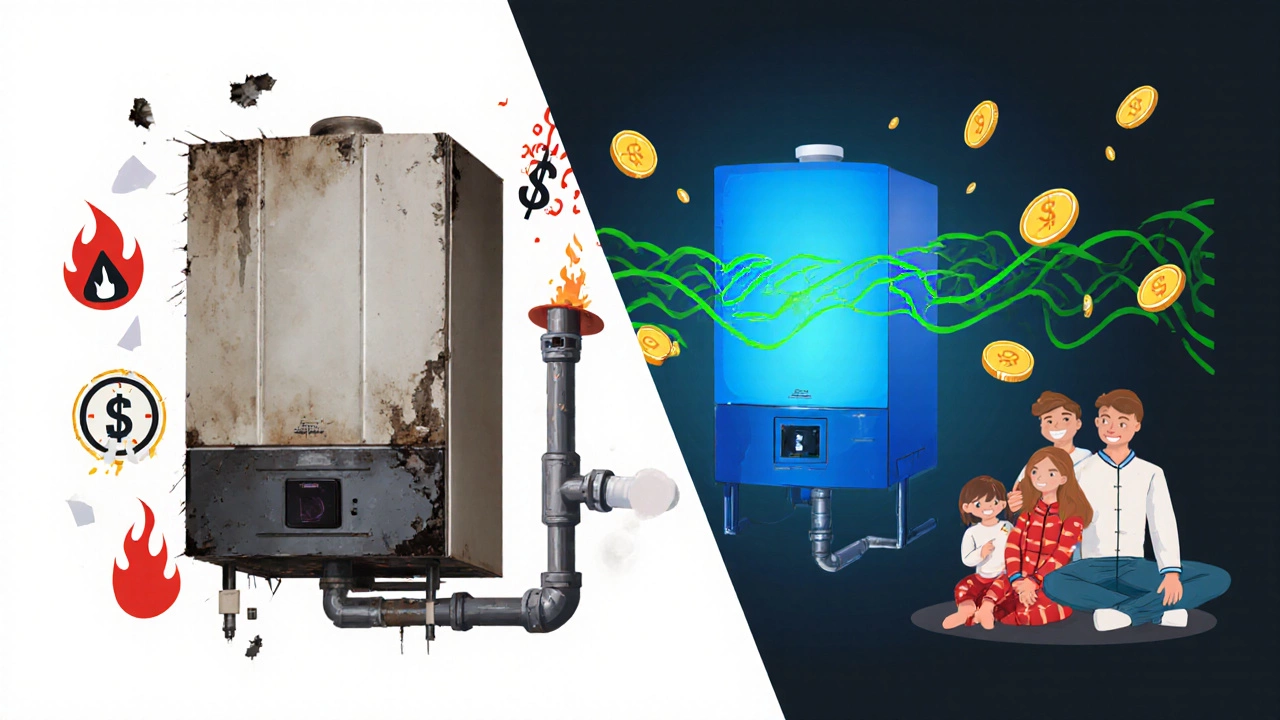
When repair still makes sense
There are a few cases where fixing your boiler is the right call:
- Your boiler is under 8 years old and the repair is minor (like a thermostat or sensor).
- You’re planning to move within 2-3 years and don’t want to invest in a new system.
- You’ve just had a major repair done and the boiler is still under warranty.
But even then, get a second opinion. Ask the technician: “If this was your house, would you fix it or replace it?” Most pros will tell you the truth.
What to look for in a new boiler
Not all boilers are the same. Here’s what to ask for:
- Condensing boiler - Must be standard. These recover heat from exhaust gases and are the most efficient.
- Output rating - For a 3-4 bedroom home in Brisbane, aim for 24-30 kW. Too small and you’ll struggle in winter; too big and you waste energy.
- Brand reliability - Worcester Bosch, Vaillant, and Baxi have the best track records in Australia. Avoid no-name brands.
- Smart compatibility - Look for models that work with Google Home, Alexa, or Apple HomeKit. You can schedule heating, get alerts for faults, and adjust remotely.
- Installation quality - The boiler matters less than who installs it. Choose a licensed plumber with 10+ years of experience. Ask for references.
Bottom line: The 80% rule
Here’s a simple rule most professionals use: if the repair costs more than 80% of what a new boiler would cost, replace it. For example, if a new boiler is $4,500, don’t spend more than $3,600 on repairs.
But even if it’s below that threshold, ask yourself: How many more years will this last? If the answer is less than 3, replace it. You’re not just buying a machine-you’re buying peace of mind, safety, and lower bills for the next decade.
Boilers are one of the most important systems in your home. Don’t gamble with it. When in doubt, replace. The money you save on energy, repairs, and emergencies will pay for the new unit in just 2-3 years.
Is it cheaper to repair or replace a boiler in the long run?
In the long run, replacing an older boiler is almost always cheaper. While a repair might cost $500 today, repeated fixes over 3-5 years can add up to $2,000 or more. A new boiler costs $3,000-$6,000 upfront but cuts gas bills by 30-40%, comes with a 10-year warranty, and avoids emergency breakdowns. Most homeowners break even on the replacement cost within 2-4 years.
Can I get a government rebate for boiler repair?
No. Government rebates in Queensland and other Australian states only apply to replacing old boilers with high-efficiency models. You cannot get a rebate for repairs. The goal of these programs is to reduce energy use and emissions, so they only support upgrades.
How do I know if my boiler is dangerous?
Signs your boiler is dangerous include a yellow or orange flame (instead of blue), a rotten egg smell (gas leak), soot around the boiler, or the boiler shutting off unexpectedly. These indicate incomplete combustion or gas leaks, both of which can produce deadly carbon monoxide. If you see any of these, turn off the boiler, open windows, leave the house, and call a licensed plumber immediately.
Should I replace my boiler before it breaks?
Yes-if it’s over 10 years old and you’re seeing signs of decline like higher bills, odd noises, or slow heating. Waiting until it fails means you’ll face emergency repair costs, no choice in timing, and possibly a higher-priced replacement during peak season. Planning ahead lets you shop around, get quotes, and take advantage of rebates.
How long does a boiler replacement take?
A standard boiler replacement usually takes one full day. A licensed plumber will remove the old unit, install the new one, connect gas and water lines, test for leaks, and ensure everything works safely. If you’re switching to a different type of boiler (like from a regular to a combi), it might take 1.5 to 2 days.
